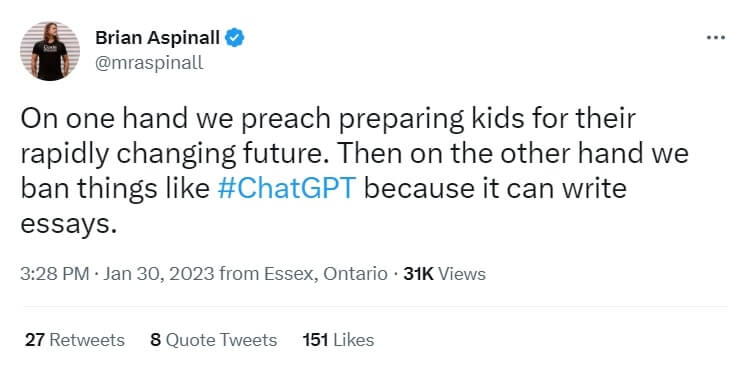“ChatGPT is scary good. We are not far from dangerously strong AI.”
Elon Musk (@elonmusk) Twitter, 3 Dec. 2022
“ChatGPT is incredibly limited, but good enough at some things to create a misleading impression of greatness.
it’s a mistake to be relying on it for anything important right now. it’s a preview of progress; we have lots of work to do on robustness and truthfulness.”
Sam Altman (@sama) Twitter, 11 Dec. 2022
“ChatGPT could be a good debugging companion; it not only explains the bug but fixes it and explain the fix 🤯”
Amjad Masad (@amasad) Twitter, 22 Nov. 2022
At the close of 2022, ChatGPT made a remarkable impact in the tech industry, emerging as one of the most highly rated chatbot systems on the web. This innovative online tool has garnered attention for its ability to respond to an extensive range of questions, create original songs, and even identify bugs in code. One thing that sets ChatGPT apart from other AI models is its training on an unparalleled volume of data. It allows the chat to complete complex tasks which require hard and soft skills.
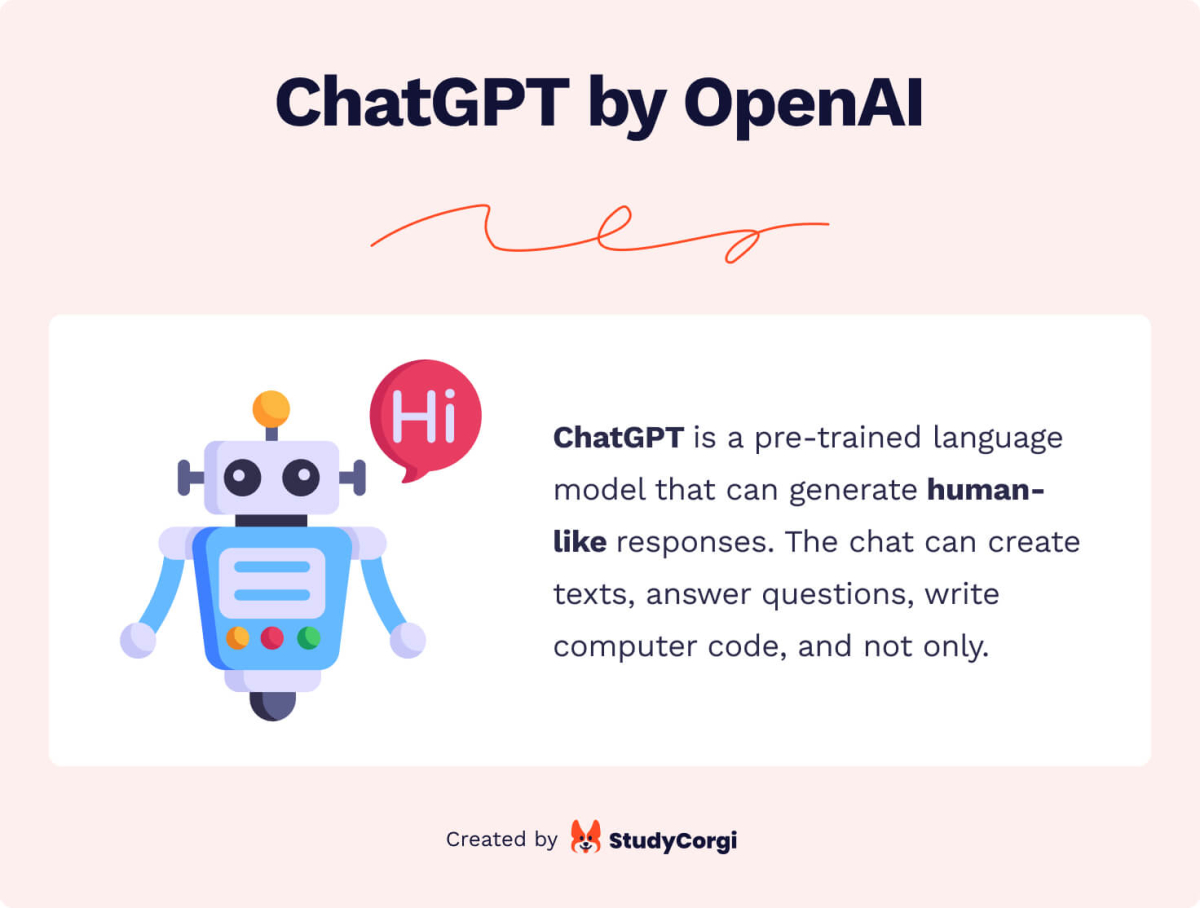
Although it all sounds wowing, there are still big questions about the abilities and perspectives of ChatGPT. One of the biggest concerns is the threat to some careers – they might be at risk of disappearance. Education professionals, support staff, copywriters, and other jobs involved in creating written content may experience various changes within their respective fields. Search engine developers, notably at Google, are also quite bothered as a chatbot might substitute them and produce results more rapidly and with less redundant information.
Despite everything, it’s essential to recognize that ChatGPT is still under development, and creators are actively fixing bugs, training the system, and fighting ethical issues. While it may be premature to evaluate the chatbot’s future yet, we can familiarize ourselves with its abilities and potential risks.
🤔 OpenAI and ChatGPT – All You Need to Know
Every new powerful AI tool significantly impacts how we engage with innovative technologies, and ChatGPT is no exception.
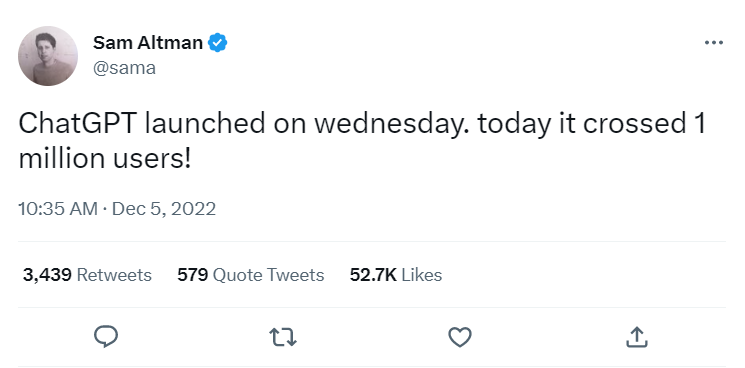
It is crucial to figure out the properties of this language model and the tasks it can accomplish. Let’s start with some basic questions.
What Is ChatGPT?
ChatGPT, or Generative Pre-trained Transformer, is an advanced AI chatbot system designed for fluent language processing. This tool enables natural, human-like conversations, generates text, and checks codes. ChatGPT leverages artificial intelligence to identify patterns in vast amounts of text from multiple sources, delivering informed and relevant answers to users’ inquiries.
Who Built ChatGPT?
ChatGPT was created by OpenAI – the artificial intelligence research and deployment company, in November 2022. The tool is based on OpenAI’s GPT-3 family of big language models and is modified using supervised and reinforcement learning approaches. Since its release, ChatGPT has been drawing attention for its thorough responses and clear answers across various expertise fields.”
How Does ChatGPT Work?
ChatGPT is a significant language model that may construct human-like sentences to answer inquiries or address customers’ problems. All that is needed from the users is to input straightforward queries, and the tool will provide them with replies in a matter of seconds. Its responses are drawn from massive amounts of data and cover all the topics you can think of.
What Does It Do?
There is a variety of tasks the AI bot can handle. Here are some examples:
- Create content. The tool can produce high-quality texts in various formats, styles, and genres.
- Explain complicated topics. With the help of ChatGPT, it is easy to understand a complex concept.
- Give relationship advice. Although the system cannot precisely read emotions, it may offer helpful advice for handling relationships with friends, family, and partners.
- Create a CV. The chatbot is one of the easiest ways to build a resume online in a minute.
- Write a code. ChatGPT may assist you in writing a code or detecting the problem inside it, potentially saving you hours of searching for a missed comma.
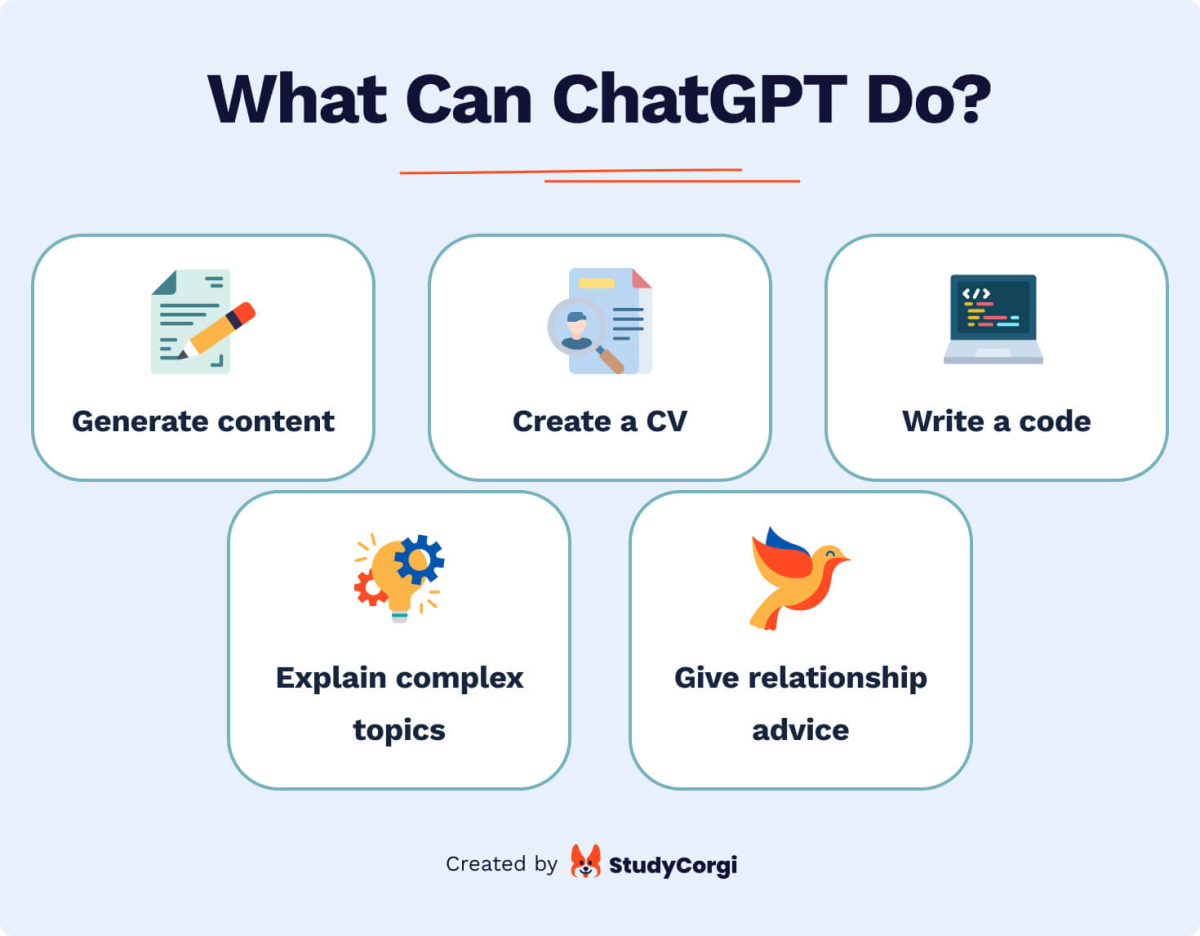
Google Vs. ChatGPT
ChatGPT is considered a threat to Google. The tool’s value comes from its capacity to explain complex things as if you were speaking to a human and to perform easy writing assignments. On the other hand, Google is more aware of our identity and adjusts the search results to reflect our preferences. Besides, Google serves as a portal to the Internet, directing users to a wide variety of websites that contain far more information than ChatGPT can process.
🤖 How Will ChatGPT’s Affect Our Life
Being a powerful tool, ChatGPT will affect whole industries. Its ability to complete intellectual tasks will simplify some processes, but it also might be a significant threat in other cases. Professionals will need a while to adapt to the new reality where a chatbot deals in seconds with the assignment they have been practicing for years.
Although ChatGPT is trained for various tasks, the most significant effect of this tool will be on jobs related to the development of text content, search engines, and code writing.
- Search Engines. If OpenAI can develop a cheap approach to train the AI model and allow it to study the Internet in real-time, Google and other search engines are under threat. People will rely on ChatGPT to get answers to their questions in a dialog format. It allows them to receive an exhaustive response and specify queries to the details that Google or other search engines can’t handle yet.
- Education. Even though ChatGPT makes it easier for students to cheat, it’s also an excellent online tutor. The AI can explain complicated topics, generate exercises, and provide unique examples. That makes it challenging for teachers to find a way to integrate the chatbot into the learning process. Many educators have already realized that instead of banning the chat, it is better to make it work for them.
- Writing. ChatGPT isn’t the first AI technology that creates written content. One thing that sets the chatbot apart from other similar technologies is its ability to generate content of any style, genre, and tone. For content creators, ChatGPT may become a best friend or the worst enemy, depending on how they implement it. It’s worth noting that AI-generated texts go against Google policies, and webpages that publish such content get sanctioned. For the time being, it may reassure writers that their skills are still required and are in demand.
- Travel Industry. ChatGPT has the potential to revolutionize the travel industry by providing travelers with tailored recommendations and route planning. The advanced AI technology can analyze individual preferences and suggest travel destinations, making traditional travel operators who plan trips based on personal preferences less in demand. It means that travelers and tourists may no longer need the assistance of travel operators. It’s also worth noting that many prominent players in the travel industry have already embraced AI, using it to power chatbots, destination recommendations, and even personalized destination photos. For example, booking websites like Booking.com use machine learning algorithms to suggest accommodations based on your previous stays and display reviews from travelers from your country.
- Programming. Last but not least, ChatGPT will noticeably affect the world of coding. Programmers are already testing the chat with might and main exploring its opportunities, weak points, and capacities. Experts conclude that ChatGPT will be an indispensable tool for coders: it will assist in writing code, debugging it, and optimizing routine tasks. However, the model is not yet a threat to programmers as it can’t take over creative thinking.
🧑💻 ChatGPT and Job Market Transformation
Over the years, job security has considerably worsened due to technological progress, and ChatGPT will take a significant part in this process. If machines formerly replaced physical labor, we are now witnessing how they replace intellectual work. Given ChatGPT’s capabilities and potential impacts, it’s worth exploring which jobs may be at risk, which ones will undergo significant changes, and what new career opportunities may arise as a result.
Jobs at Risk of Disappearance
- Customer service agent/assistant. An AI tool can deliver a quick natural-sounding response in a short time.
- Copywriter. If the developers update ChatGPT with a creativity function, the profession of copywriter will likely not be in demand soon.
- Translator. The chatbot may produce accurate spoken or written text translations in real time, cutting translation time and expense.
- Receptionist. Automated check-in kiosks operating AI-powered systems might replace humans at the front desk.
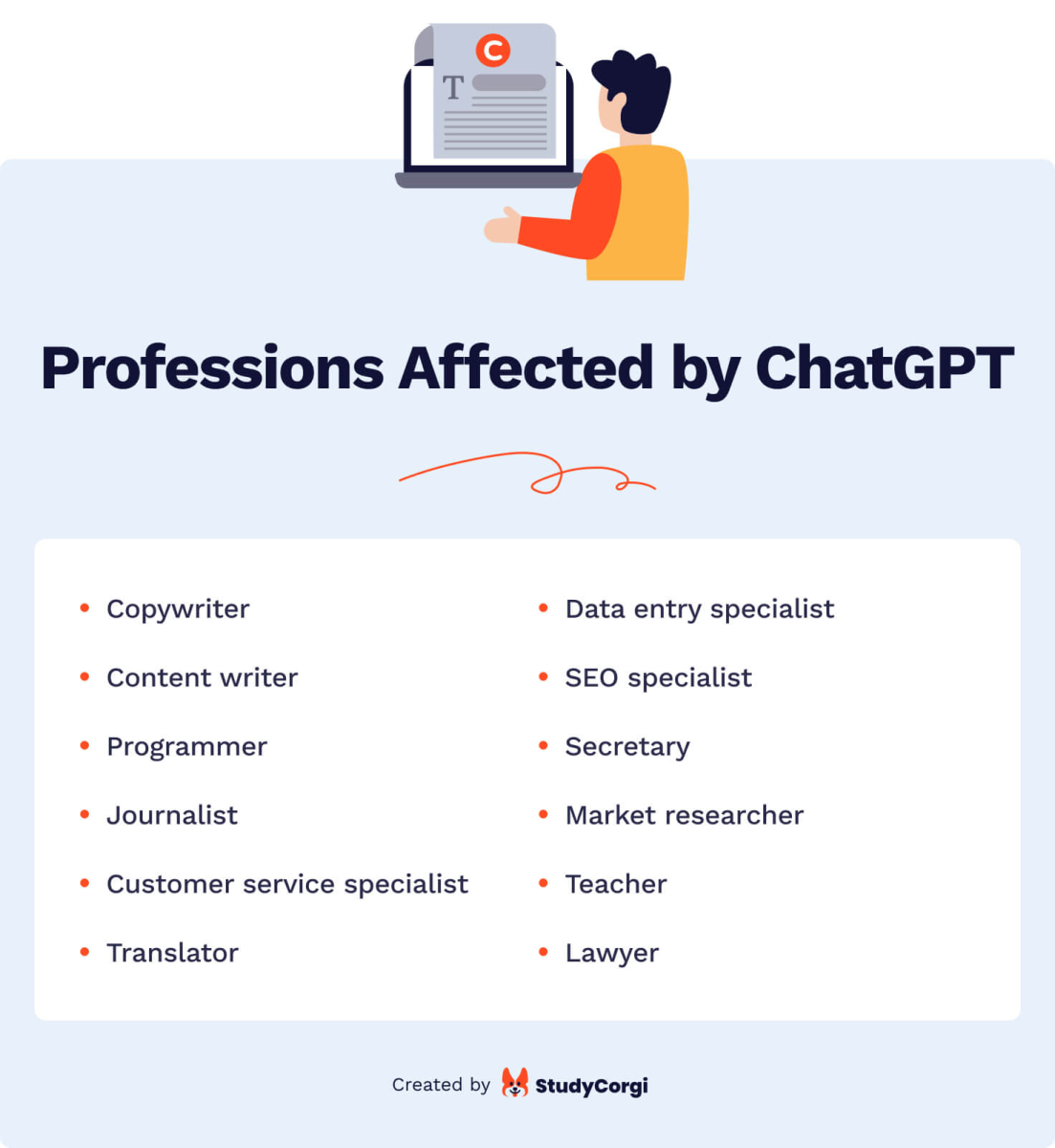
Jobs to Be Adjusted
Programmer. ChatGPT can translate code into different programming languages or find a missing comma. However, an AI chatbot cannot rectify faults that were not in the training data, and it also can’t create software considering the demands of a particular business.
Content writer. Professionals that create text for marketing initiatives and social media platforms must be aware of ChatGPT’s capabilities. The system can generate blog topics, detect important thematic fields, and find data resources.
Journalist. ChatGPT offers journalists significant benefits, such as generating written content in real-time and quick access to information. It can increase productivity and save time for journalists. However, the increasing reliance on AI technology in journalism also raises concerns about job loss in certain areas of the industry and the accuracy and reliability of information generated by ChatGPT. There are also important ethical considerations, such as the implications of relying on AI-generated content for news reporting.
Teacher. The impact of ChatGPT on the professional life of teachers can be seen as both promising and concerning. On the one hand, AI technology has the potential to provide valuable assistance in areas like lesson planning, student assessment, and personalized learning. On the other hand, the increasing reliance on AI in the classroom could result in job loss for human teachers and raise important ethical questions about the use of AI in education. Teachers must carefully consider the potential benefits and drawbacks of incorporating ChatGPT into their teaching practices.
Lawyer. The field of law is poised to experience significant advancements with the implementation of ChatGPT. The system’s ability to analyze legal papers, precedents, and judgments can streamline the research process and provide valuable insights. However, it’s important to note that while the chatbot can assist with various legal tasks, the technology cannot make independent decisions or render judgments human-like. Legal professionals need to maintain a critical eye toward the limitations and capabilities of AI-powered systems like ChatGPT.
🙋 New Job Opportunities
ChatGPT is still being improved, and it is difficult to predict what professions will emerge, but we feel certain there will be a growing need in these areas:
Careers: Robotics Engineer, Machine Learning Engineer, Software Developer
Duties:
- Build and execute machine learning models;
- Optimize datasets and data delivery;
- Inculcate human behavior to models and maximize their efficiency;
- Design and create mobile and desktop apps;
- Build operating systems for these apps;
- Build the recommendation systems.
NLP (Natural Language Processing)
Careers: NLP Researcher, NLP Analyst, NLP Scientist, NLP Engineer
Duties:
- Develop human language technology;
- Built voice recognition system;
- Optimize machine translation;
- Teach the model to derive meaning from human language.
Careers: Cybersecurity analyst, Cybersecurity engineer
Duties:
- Know and analyze the system in every detail;
- Evaluate threats that could breach the system;
- Develop protocols to respond to cyberattacks;
- Analyze malware and the behavior of cybercriminals;
- Evaluate the weaknesses of the network.
Careers: Data analyst, Data Scientist, Data Engineer, Quantitative Analyst, Data Analytics Consultant, Operations Analyst
Duties:
- Create, interpret & analyze datasets;
- Develop and employ data collection systems and strategies optimizing statistical efficiency;
- Detect and analyze trends in big data sets;
- Analyze business needs.
Careers: AI Consultant
Duties:
- Be aware of the capabilities and limitations of technology;
- Choose the right AI solution;
- Launch pilot projects to check the viability of the idea;
- Provide businesses with a roadmap for reaching AI goals.
Careers: AI Product Manager
Duties:
- Supervise the creation and launch of AI-based goods and services;
- Study consumer needs and market trends.
💻 Using ChatGPT for Work
ChatGPT can assist not only in programming and text writing but also in other areas, for example, medicine, law, etc. We’ve prepared some great examples:
1. Doctor. The medical sphere can receive many benefits from AI models. The tool can handle complex medical and clinical information and can be used by medical workers in several ways:
- To summarize medical records according to the patient’s family history.
- To answer broad questions about symptoms of spread illnesses.
- To execute scheduling operations and set appointments.
Example of a Medical Records Summary by ChatGPT
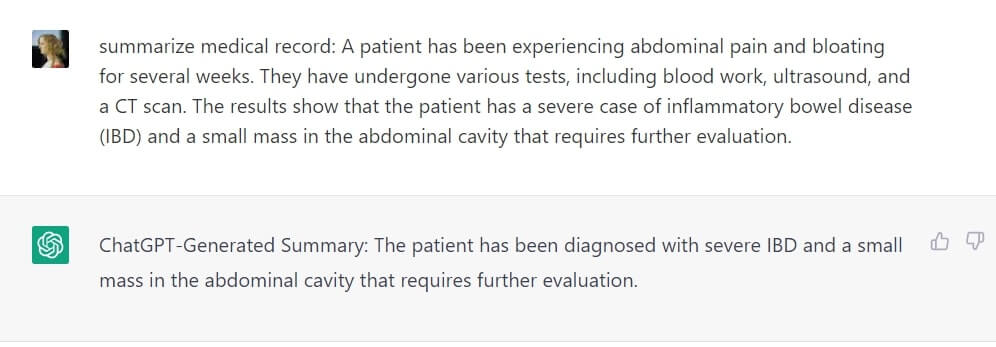
2. Teacher. Educators’ job consists of many routine tasks that take hours of work: filling out papers, assessing students’ work, responding to emails, etc. Here’s what teachers can do with the help of ChatGPT:
- Create learning plans and organize the lessons.
- Give feedback on students’ assignments.
- Monitor students’ progress.
- Respond to emails and write recommendation letters.
Example of an Essay Evaluation by ChatGPT
Here, we asked the chatbot to assess a short essay from our database written by a student. Read the full text here: Leadership and Business: Critical Points | Free Essay Example
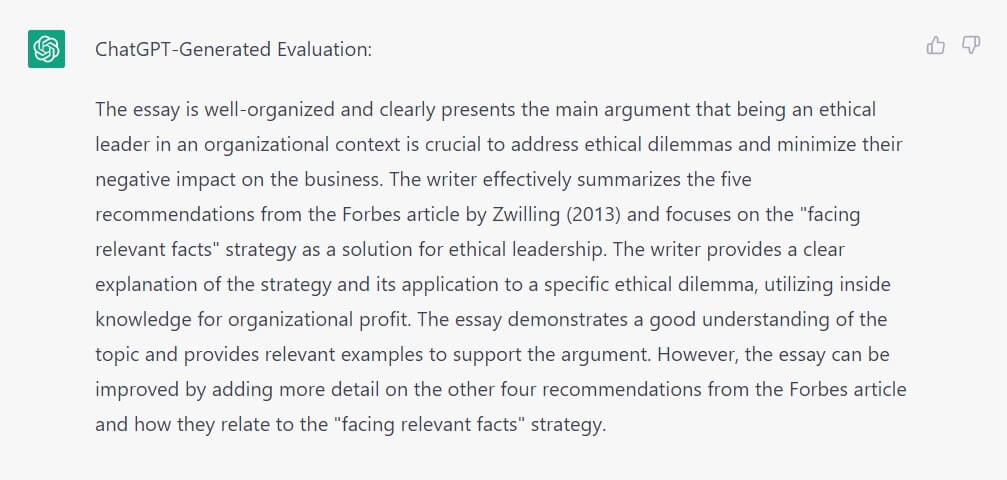
3. Lawyer. It might seem unobvious how ChatGPT can assist lawyers; however, here are the tasks it can take over:
- Document mining and analysis.
- Conducting legal research.
- Estimating the price and time needed to work on the case.
- Drafting legal papers.
Example of a Legal Risks Evaluation by ChatGPT
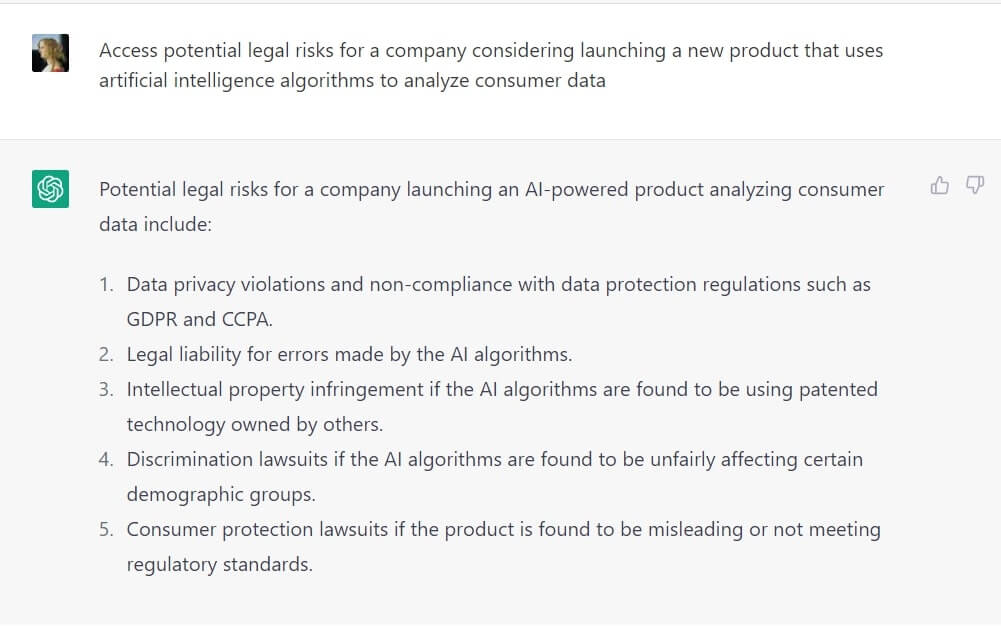
4. Web developer. Using AI tools in writing code can save a lot of time for developers. Here’s how programmers can utilize ChatGPT:
- Search for the errors in the code.
- Generate new product ideas.
- Compose test cases.
- Detect edge cases in code.
Example of an HTML Code Generated by ChatGPT
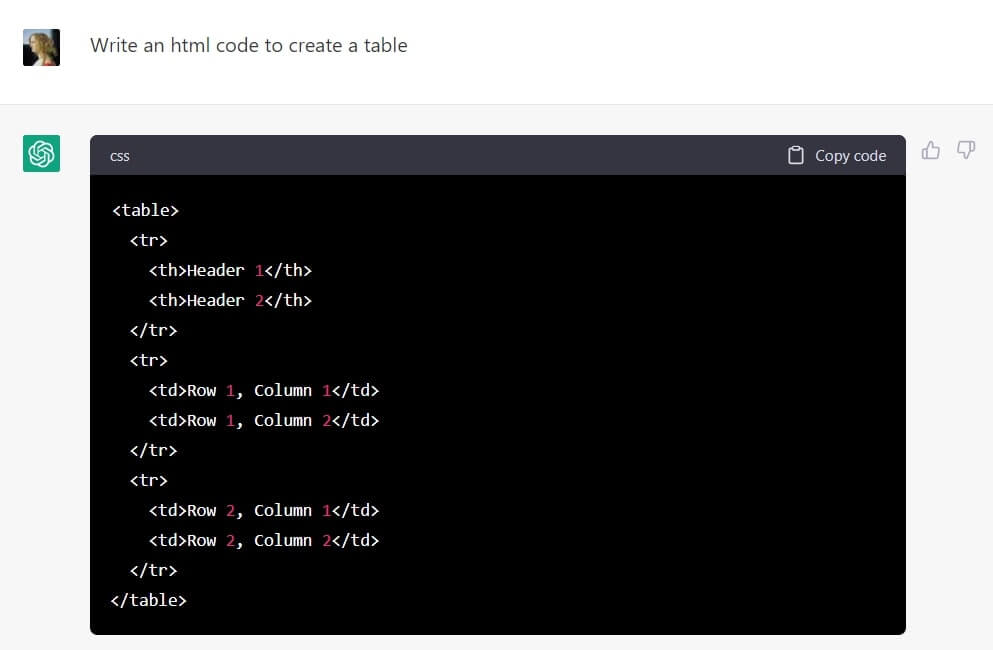
⚖️ AI Chatbot Advantages, Disadvantages, & Issues
As you have already understood, OpenAI’s ChatGPT can do things. But not everything is completely smooth yet, have a look:
Advantages of ChatGPT
- It is a multifunctional tool. The chat excels at programming, coding, and writing texts in various languages.
- It is free of charge. It is crucial that users can utilize ChatGPT for their purposes without spending a cent for now.
- You can use it for personal tutoring. The model allows students to experience an innovative learning method with individual assignments and original exercises.
- It is a time-saving app. The chatbots can automate routine work, permitting employees to focus on more essential duties.
- It is a big step for development. AI will greatly influence our lives very soon, and ChatGPT is an example of a well-trained human-like assistant.
Disadvantages of ChatGPT
- It can provide inaccurate information. The model was developed using a huge text dataset that might be inaccurate or misleading.
- You might get offensive answers. If the chatbot is used in a public or professional context, it could lead to impolite responses to its users.
- It can misunderstand the query. ChatGPT might have trouble understanding the request since language is highly context-dependent.
- It might have privacy issues. Data theft is possible if the program doesn’t protect data properly with encrypted systems.
ChatGPT Issues
ChatGPT is an outstanding AI tool, but developers still have much work to do:
- The chatbot doesn’t have a creative foundation. The text generator summarizes research but lacks the creativity to develop original concepts and ideas.
- The model can give harmful instructions or exhibit discriminatory behavior.
- Cybercriminals can use OpenAI technology to create harmful malware.
- ChatGPT’s ability to generate conversational text raises concerns about producing fake news or other deceptive information. This feature can have massive consequences, such as reputational harm, disinformation, or even violence.
As OpenAI continues to build ChatGPT and other language models, it is critical to address these risks to guarantee the technology’s safe and lawful use.
Will ChatGPT Encourage Cheating?
Like many other new technologies, AI chatbots ease students’ work as they can help with research, essay writing, language learning, etc. ChatGPT responses already resemble student essays but are more pedantic than a real author might write. Educators are puzzling over how to use the chatbot as a helpful method of critical thinking and not just as a machine that will do everything for students.
💡 Bonus: TOP Business Ideas for ChatGPT
Developing AI technologies has opened up a whole new realm of possibilities for businesses. Here are a few ideas on how you may use the chat for your profit:
- Sale copywriting. You can use ChatGPT to create copies of descriptions, essays, or other writing materials in a short period.
- Virtual assistance. AI tool can help you schedule meetings, create business plans, and conduct analysis for the companies.
- Screenwriting. ChatGPT can be very useful in writing outlines and plots for movies as it can make specific prompts for every chapter separately.
- Creating content for social media. The chatbot plays a vital role for content creators, finds data and facts about the target audience, makes graphic designs, charts, and GIFs, and even assists in video editing.
- Implementing chatbots for small businesses. Chatbots complete primary customer support functions and help businesses expand their customer base.
- Creating landing pages. A company can use language models to create landing pages to promote its products and services. ChatGPT aids in filling the page with relevant and compelling content and sharing your startup idea.
↪️ Conclusion
ChatGPT is an advanced chatbot remarkable for its ability to produce human-like language. It can aid in tasks such as paper writing, content creation, debugging code, and others. Despite its benefits, the technology still has some limitations, such as weak data protection, producing unverified answers, etc. Another significant concern is the potential violation of the chat by hackers and other cybercriminals to produce malware and malicious code.
The impact of ChatGPT on various professions is both positive and negative, as it can lead to the disappearance of some jobs and create new ones, such as AI consulting or AI product management. Additionally, ChatGPT has the potential to improve industries such as healthcare, law, and tourism by operating routine tasks and simplifying complex processes.
